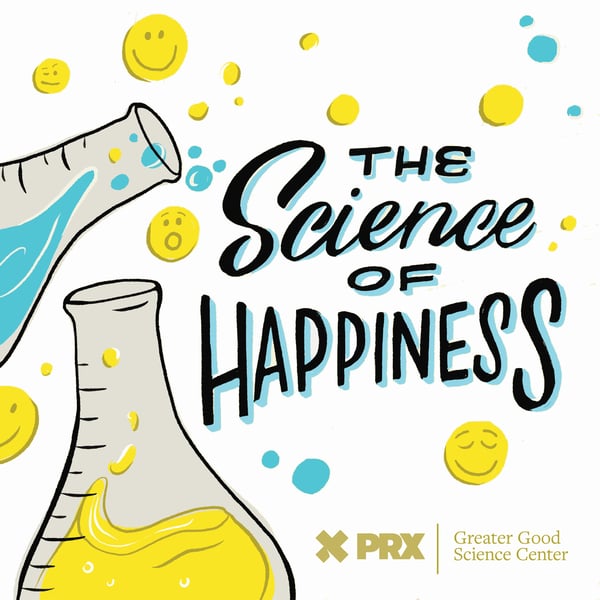When Rumination Is a Good Thing
The Science of Happiness
PRX and Greater Good Science Center
4.4 • 1.9K Ratings
🗓️ 1 September 2022
⏱️ 22 minutes
🧾️ Download transcript
Summary
When's the last time you made a good memory — intentionally? Our guest tries a practice in cultivating positive experiences and taking time to savor them.
Episode summary:
Life doesn't always hand us good times, but we can benefit as much or more when we create our own happy memories and take time to appreciate them. This week on The Science of Happiness, our guest tries a practice to intentionally create good experiences and reflect on them. Deandrea Farlow is a member of the Bay Area Freedom Collective, a re-entry home where formerly incarcerated people can find community and connections. Deandrea brings us into his experience with this practice, and shares what it’s like to find strength through the hardest times as well as positive events, like the ones he created for our show. Psychologist Meg Speer explains how ruminating on good times can actually change the way we respond to stress. .
Practice: Creating and Recalling Positive Events
1. Do an activity that you enjoy doing alone.
2. With a friend, do something that you enjoy doing with others.
3. Do something that you consider personally important and meaningful.
4. Then take a step back and really think about these three events. Write about how they make you feel. Talk about it with a friend, or just really think about it.
Learn more about this practice at Greater Good In Action:
https://ggia.berkeley.edu/practice/creating_and_recalling_positive_events
Today’s guests:
Deandrea Farlow is a member of the Bay Area Freedom Collective, a home by and for formerly incarcerated people, which provides resources and support for their re-entry.
To learn more about Bay Area Freedom House: https://www.collectivefreedom.org/
or: https://www.facebook.com/bayareafreedom/
To financially support the Bay Area Freedom Collective: https://givedirect.org/freedomcollective/
Meg Speer is a postdoctoral researcher in the SCAN lab at Columbia University. She studies how autobiographical memories and positive thoughts affect our brain function.
Learn more about Meg and her work: https://tinyurl.com/yf39acwk
Follow Meg on Twitter: https://twitter.com/mspeer3
Follow Meg on Google Scholar: https://tinyurl.com/9cn3tmbh
Resources for Recalling Positive Event:
TED —There’s an art to happy memories — you can make more by experiencing more “first”s: https://tinyurl.com/2p8sdsy7
Hidden Brain (NPR) — Nostalgia Isn't Just A Fixation On The Past - It Can Be About The Future, Too: https://tinyurl.com/5d8dej3a
Resources from The Greater Good Science Center:
Five Ways Nostalgia Can Improve Your Well-Being: https://tinyurl.com/veeraw6u
Listen to our episode, “How to Make Time for Happiness” https://tinyurl.com/yhf39awt
Listen to our last episode featuring the Bay Area Freedom Collective, “How to Feel Less Lonely and More Connected” https://tinyurl.com/4d6dm9zp
We’d love for you to try out this practice and share how it went for you. Email us at [email protected] or using the hashtag #happinesspod.
Help us share The Science of Happiness!
Leave us a 5-star review on Apple Podcasts or copy and share this link with someone who might like the show: pod.link/1340505607
Transcript
Click on a timestamp to play from that location
| 0:00.0 | The last nice thing that I did for myself was to exercise this morning. |
| 0:08.0 | By myself and iced coffee, even though I could have made one for myself at home. |
| 0:14.0 | The last nice thing I did for myself was design and build a pretty cool little amplifier. |
| 0:19.0 | The last positive activity I did with someone else, I went with a friend to the beach |
| 0:28.0 | and we just grabbed a bottle of wine on the way and talked on the beach for like three hours. |
| 0:36.0 | The last fun thing that I did with someone else was to play Legos with my kid this morning. |
| 0:43.0 | I played in a benefit concert with a bunch of people. |
| 0:49.0 | The last thing I did that was personally important and meaningful was |
| 0:54.0 | taking anger management class. |
| 0:57.0 | I read through a lot of my old journal entries from the last several years. |
| 1:04.0 | The last thing that I considered personally important and meaningful was to speak out of length with my father |
| 1:11.0 | who's just recovering from an illness. |
| 1:14.0 | Last night before bed, my husband and I got some good conversations going which we hadn't had in a while. |
| 1:23.0 | Ruminating on the good things in life, taking time to enjoy past moments of happiness, |
| 1:29.0 | has a lot of astounding effects, greater life satisfaction, less feelings of hopelessness and depression. |
| 1:35.0 | But we don't have to wait for good things to happen to us. |
| 1:38.0 | We can create our own positive experiences and that's what we're going to practice today. |
| 1:43.0 | I'm Dacker Keltner and welcome to the Science of Happiness. |
| 1:46.0 | Today we're going to explore a happiness practice where you intentionally create good experiences in your life |
| 1:51.0 | and then dedicate some time to reflect on them and write about them. |
| 1:55.0 | Later in the show, we'll look at an experiment exploring how our brains are affected when we try this positive memories practice |
| 2:02.0 | under really stressful situations. |
... |
Please login to see the full transcript.
Disclaimer: The podcast and artwork embedded on this page are from PRX and Greater Good Science Center, and are the property of its owner and not affiliated with or endorsed by Tapesearch.
Generated transcripts are the property of PRX and Greater Good Science Center and are distributed freely under the Fair Use doctrine. Transcripts generated by Tapesearch are not guaranteed to be accurate.
Copyright © Tapesearch 2025.

